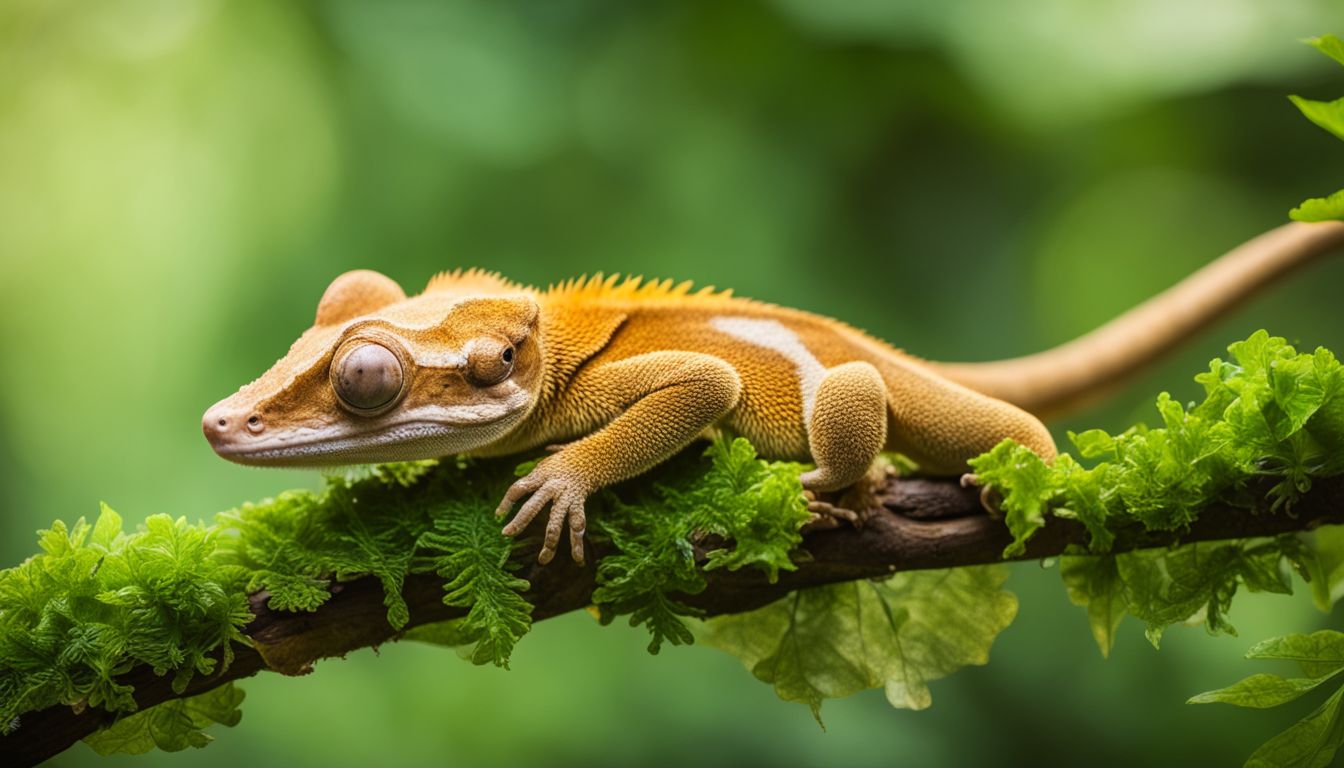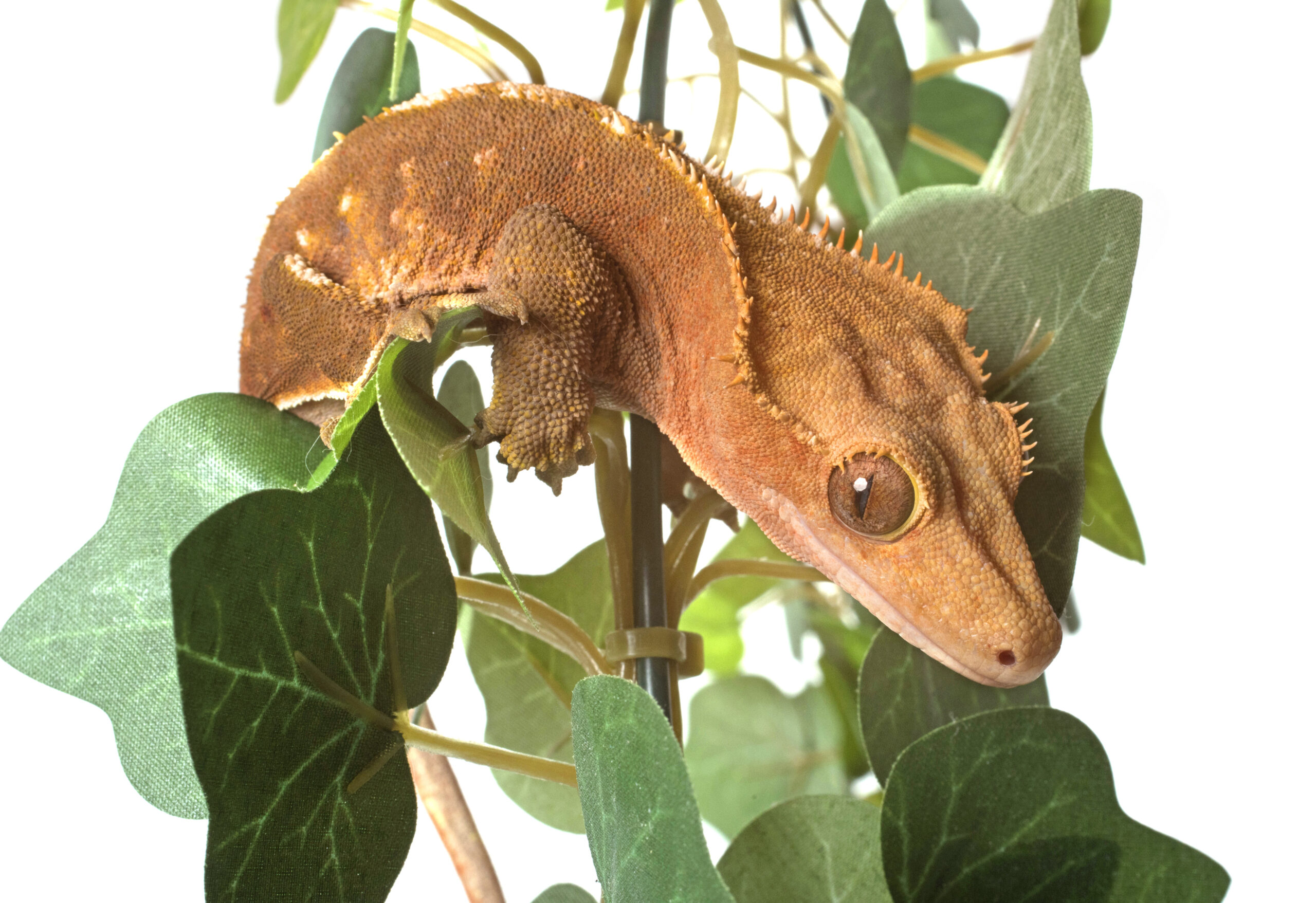Have you ever seen your crested gecko perched happily on a branch and wondered, “Can these little climbers handle the water?” It’s a question many new pet owners ask when they think about the various needs of their scaly friend.
Understanding how crested geckos interact with water is crucial for keeping them healthy and stress-free.
Here’s an interesting fact: While not avid swimmers, crested geckos can instinctively move in water if necessary. Our article dives into what this means for your pet and how you should manage its encounters with H2O.
From natural habitats to proper care tips, we’ll explore everything you need to keep your crested gecko safe around water without causing undue stress. Keep reading – there’s more to learn about these fascinating reptiles!
Key Takeaways
- Crested geckos can instinctively swim if necessary, but it’s crucial to understand that their natural habitat does not typically include bodies of water.
- While they have swimming abilities, forcing them into deep water can cause stress, potential drowning, and health problems such as infections from staying wet too long or dirty water.
- Providing suitable watering methods like misting the enclosure and safe bathing techniques instead of subjecting them to deep water respects their natural instincts and helps maintain their well-being in captivity.
Can Crested Geckos Swim?
Crested geckos do have the ability to swim, but their natural habitat does not typically include bodies of water. While they may instinctively swim if necessary, it is important to understand the risks and ensure proper safety measures are in place.
Instinctive Swimming Abilities
Geckos, like crested geckos, have a natural skill to swim. This comes from deep inside them and helps them when they face danger. Their tails are shaped in a way that makes it easy for them to move through water quickly.
But even though they can do this, swimming is not something they love to do all the time.
Being put into deep water isn’t safe for crested geckos. It can make them scared and even hurt their health. That’s why we must take care of how we use water with these little creatures.
– The Risks of Swimming for Crested Geckos
The Risks of Swimming for Crested Geckos
Crested geckos may have natural swimming abilities, but this doesn’t mean they are out of danger in the water. Deep water poses a big threat to these small creatures. They can get tired quickly and sometimes cannot reach safety, which may lead to drowning.
Also, their bodies are not made for living in water like fish or frogs.
Putting crested geckos into water can also cause stress and health problems. It is scary for them because they do not swim often in the wild. Their skin might get infections from staying wet too long or from dirty water.
Always watch your pet if it’s near deep water to keep it safe and healthy.
Understanding Crested Gecko’s Natural Habitat

Crested geckos are native to New Caledonia, an island in the Pacific Ocean, where they inhabit tropical rainforests with high humidity levels. In the wild, these geckos live in trees and bushes and are not known for swimming, but they do have a natural affinity for moisture and can often be found near water sources.
Relationship with Water in the Wild
In their natural habitat, cresties live in rainforests near small streams and moist areas. They do not spend much time swimming. Instead, they like to climb trees and stay above the ground where it’s safe and dry.
Little geckos might cross water if they have to escape from danger or find new places to live.
Water does play a part in their life though. These geckos drink drops of water from leaves and get wet when it rains. This keeps them healthy and clean. But most of the time, crested geckos prefer being among the leaves rather than in the water below.
The Dangers of Forcing Crested Geckos to Swim
Forcing cresting geckos to swim can lead to stress and potential accidental drowning, which goes against their natural instincts and habitat preferences. Read on to learn more about proper water practices for cresting gecko care.
Stress Factors
Stress Factors
Crested geckos can feel stressed when placed in water, especially if they are not used to it. This stress can be harmful to their health and well-being. It’s important to avoid causing stress by forcing them into water or exposing them to deep water without supervision.
Additionally, sudden changes in their environment, such as being soaked or submerged in water, can lead to stress for these little creatures.
Potential for Accidental Drowning
Crested geckos have the potential for accidental drowning if exposed to deep water. They are not strong swimmers and can tire quickly, leading to drowning or stress-related issues.
It is crucial to provide shallow water areas if bathing your gecko and always supervise them during any water exposure.
Understanding their natural limitations in swimming will help you create a safe environment for your pet. Now let’s explore Crested Gecko’s Natural Habitat.
Proper Water Practices for Crested Gecko Care
Adequate spraying instead of swimming and safe bathing techniques are essential for the well-being of your crested gecko. To learn more about how to properly care for your crested gecko’s water needs, continue reading our blog.
Adequate Spraying Instead of Swimming
Crested geckos can get the water they need through spraying. Here’s a list of how to provide them with water:
- Mist the enclosure: Use a spray bottle to mist the tank two times a day, ensuring that there’s enough moisture for your gecko.
- Create a humid hide: Place a small container filled with damp moss or paper towels in their tank, providing them with a cozy spot to retreat and absorb moisture.
- Use a drip system: Install a drip system to simulate rain, allowing them to drink droplets off leaves or catch water falling from above, just like in their natural habitat.
Safe Bathing Techniques
To ensure the well-being of your crested gecko, it’s important to use safe bathing techniques instead of exposing them to deep water. Here are some safe bathing techniques you can use:
- Shallow Water: Use a shallow container with lukewarm water, just enough for your gecko to wade in comfortably.
- Gently Introduce: Place your gecko in the water gently and let them explore at their own pace.
- Supervision: Always supervise your gecko while they are in water to ensure their safety.
- Short Duration: Limit the time spent in water to avoid stress on your gecko.
- Drying Off: After the short bath, carefully dry off your gecko to prevent chilling.
FAQ: Common Concerns about Crested Geckos and Water
- FAQ: Common Concerns about Crested Geckos and Water
- “Do crested geckos need a water bowl in their enclosure?” Yes, a shallow water dish should be provided for drinking and maintaining humidity.
- “Can I give my crested gecko a bath?” Yes, occasional misting or light spraying is preferable to bathing, as it mimics their natural environment.
- “Is it safe to let my crested gecko swim for exercise?” While they can swim, it’s best to avoid subjecting them to deep water as it can cause stress and potential harm.
- “Should I worry if my crested gecko avoids the water?” Some may not be inclined to soak in water; however, ensuring proper humidity levels is crucial for their health.
- “Can I use tap water for misting or providing drinking water?” Use dechlorinated or filtered water to avoid harmful chemicals that can affect your gecko’s well-being.
Conclusion: Respecting the Natural Preferences of Crested Geckos
In conclusion, crest geckos have the natural ability to swim. Respecting this ability means understanding their limitations and instincts. Providing a safe environment and avoiding forcing them into water is crucial.
By acknowledging their natural preferences, we can ensure their well-being in captivity. Proper care involves respecting their swimming capabilities without exploitation or unnecessary risks.
Ultimately, understanding and accommodating these natural behaviors enhances the overall welfare of crest geckos in our care.
If you’re curious about other gecko species and their diets, find out if leopard geckos can eat nightcrawlers here.
FAQs
1. Can crested geckos swim?
Crested geckos are not natural swimmers and may drown if placed in deep water, so it’s essential to avoid submerging them.
2. How should I provide water for my crested gecko if they can’t swim?
A shallow dish with clean, dechlorinated water is suitable for crested geckos to drink from and maintain humidity, ensuring it’s not deep enough for them to drown.
3. What happens if a crested gecko accidentally falls into water?
If a crestie falls into water, gently remove it immediately and ensure it is dry to prevent stress or respiratory issues.
4. Can I create a swimming area for my crested gecko in its enclosure?
It’s best not to include a swimming area in the enclosure as crested geckos are not strong swimmers and can get stressed or injured in the process.
5. Do all reptiles have the ability to swim?
While some reptiles are strong swimmers by nature, like turtles and certain lizards, others such as crested geckos are not built for swimming due to their body structure and behavior patterns.




